I checked the ASL.library units of MorphOS and Amiga 68k against the official C includes of the SDKs. Especially the TFileRequester structure was always a little bit trouble because the old Amiga asl unit still used the old field names rf_* but from V38 of the Library this fields are all names fr_* and some other tiny dame differences (e.g. Dir vs. Drawer). In AROS and AmigaOS4 I only added the newer names because here I do not have any „old“ code. This resulted in a big inconsistency between the platforms and need ifdef’s in the final programs. To prevent a direct breakage of the existing sources (e.g. LCL, MUIMapparium) Amiga and MorphOS have both field names in the structure (as case). The aim will be to remove that ifdef’s from the sources.
Of course the freepascal compilation did not work, still needs some link library and stuff. (Hint for later at least libc6-dev and libgcc-5-dev is needed) I restarted first a plain compilation and hmm it still runs 😉 the tests will need to wait a little bit. Besides that of course I played more with the system, of course its even slower that way because the compilation is running in parallel. Installed some packages I need on there, telnetd for example, sshd just slows the poor 68030 to much down. For file transfer I want to join it the normal NFS network I have already. But when installing nfs-common I was really shocked it has python as recommend, really? Python for NFS? On my normal computer I do not care it’s usually there already but on Amiga, space (and more important installation time) is short 😉 so need to with „–no-install-recommends“ But my personal opinion is when a simple network file protocol from the early years of Unices pull the most hyped script language monster (15.5 MB additional crap!) then there is clearly something wrong in your package system.
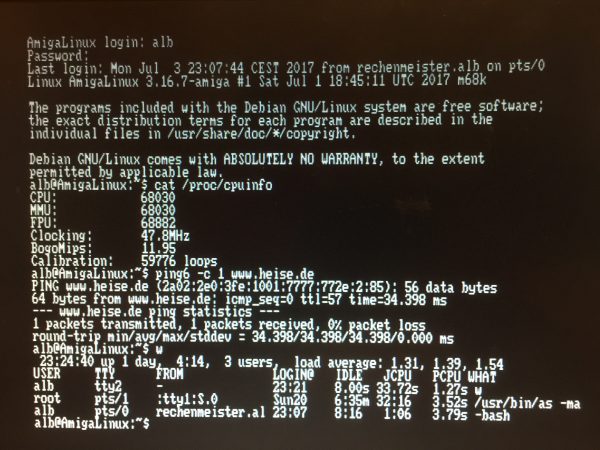
IPv6 on an Amiga
As you can see the compilation still runs 😉 (the Assembler as runs currently on other TTY) and even IPV6 works! An Amiga doing IPV6, welcome to 21. century (no Amiga OS is currently able to do that). The system runs rock stable (uptime already 28 hours) even I stress it with parallel installation and other changes and let the compilation run. Very nice and stable just a little bit slow.
To help ChainQ with the FreePascal for m68k compiler bug finding I installed a qemu-m68k on my server together with a chroot environment to let the FreePascal testsuite run. An ChainQ really found a lot of bugs. I also improved the chroot environment. The number of fails falled down from 160 to 34 which is a good value more than i386 (around 20) but better than PowerPc (around 40) 😉 already a nice achievement. But I thought it would be even cooler to start the test suite directly natively in a m68k Linux environment. (also qemu-m68k maybe has some bugs :-P) The only real hardware I have available for that is my Amiga 1200 with 68030, luckily it has a MMU so Linux will be possible. (The Amiga 600 with Vampire does have no MMU therefore Linux is not possible to use) Informations about this topic are very hard to get and most of the links are dead today. So in the end I compiled the kernel (3.16.7) on my own and created a initramfs by hand. For initial root I used the chroots debian environment I use already for the fpc tests. But systemd made me much headache, it was much easier to write a own little init script. Finally the systems boot and even the PCMCIA card works, I can SSH to that server.
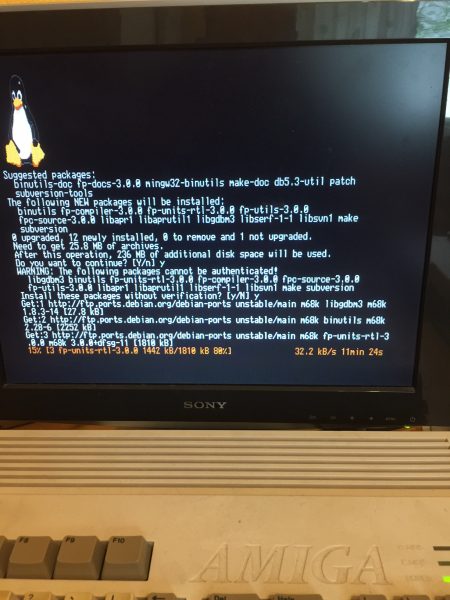
Linux on a Amiga 1200 with 68030
The next is installing FreePascal and try to run the compilation and finally the test of course. There are some unexpected problems here. Usually the latest FPC from trunk requires the latest stable FreePascal version, that means at the moment 3.0.0 or 3.0.2 but both can’t compile the trunk because some features missing in 3.0. I tried to merge them from the trunk but failed to many things missing and not easy to identify which else should be merged. So I will use the 3.1.1 as starting compiler (and ignore the warning that this is not supported 😛 yeah I’m a real outlaw) sadly it also have some problems I have to check later. For first try I just start the testsuite with the compiler cross compiled on my other Linux (x64) computer. The testrun started today at 22:15 will it run completely and if yes how long will that need? a week? 🙂 We will see.
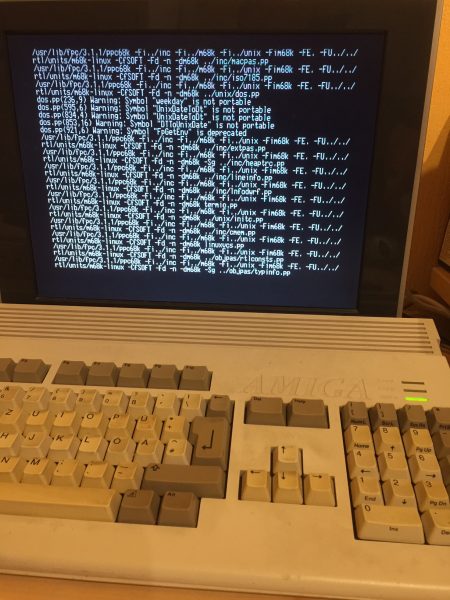
Compiling/Testing FPC on m68k Linux
Still playing with locale settings on Amiga systems. FreePascal offer a possibility to care about international settings like decimalseparator, date formats and currency symbol. So I looked a little bit into and the system is comparable, still much work, so I’m not sure if really put to every start of a program, or maybe it would be better to put it to a separate unit and you have to include and invoke it by hand. We will discuss that.
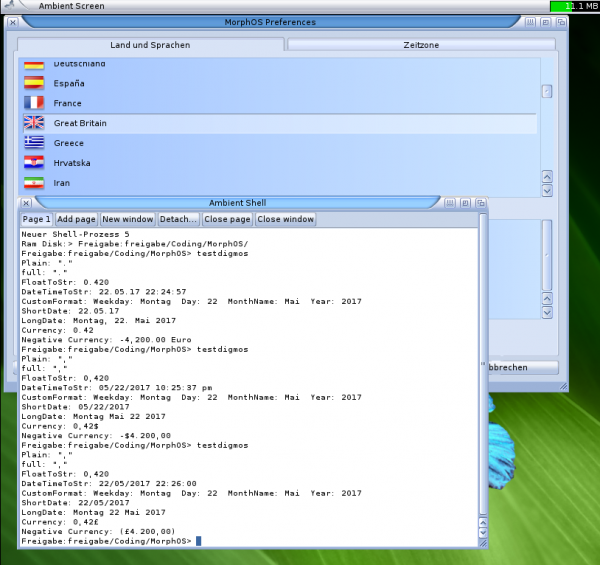
Testprogram with Germany, USA and UK Locale Setting
Starting the same test program 3 times and changed the Locale Country setting in between. (For me rather funny that the currency format for positive and negative Values are so different not so nice if you have them in a table) But so far it works very nicely.
Yesterday I was at the Amiga and retro computer meeting here in Berlin, always nice to be there and talk to the people. ChainQ was also there so we worked a little bit on this strange WBStartup problem on MorphOS. As some already mentioned in the comments to MUIMapparium, it is not possible to start fpc compiled programs at MorphOS via an Icon. The programs just do not start directly freeze, the reason is simple, when starting via Icon the WBStartup Message is sent to the application via an MsgPort at the Process structure. Freepascal waits for this Message, which never arrives. After some trying we found, that the needed structures and functions in fpc are in good shape so not the root of this problem. The problem appeared when ChainQ changed the startup code from a assembler one to a pure Pascal startup code. So my guess was that it somehow relates to the needed symbol inside the executable, which defines it as a MorphOS executeable __abox__. Of course I do not have much knowledge about it, just a wild guess. But it turns out that this was quite right. The first problem is that I used an older version of vlink, which seems to have a bug and removed this symbol (because never used). After an new compilation of vlink the __abox__ symbol is there but still it do not work. ChainQ knows a little bit more about this stuff and also knows whom to ask in the inner circle of MorphOS developer what could be the root of it. Some strange things I was able to see, the program I started stopped when starting via Icon. But via TaskManager you can see, two of them are started. An other thing with Snoopium you can check when the program does at the start. Especially the OpenLibrary function is interesting in this case. You can see how the program tries to open the ppc.library, which I learned now, is a sign that MorphOS thinks that this program is an PowerUp executable, which explains the odd behavior. In the end the solution was not so difficult, FreePascal did not set symbol type and symbol size as expected by MorphOS. (The size is important because the __abox__ symbol should point to a longword with value one) It appears FreePascal already have a function to care about such things, which only have to be activated for the MorphOS compiler. Finally it’s fixed again. Thanks for the help.
Found a bug that the FP-IDE does not save it’s settings, like the last used size, recent files or Clipboard. All this Data are saved into the fp.dsk file in the same folder where the fp executable resists. I checked it and the file was just zero. I remember that I fixed that problem already once, but It could be that this was before FPC entered the official FreePascal repository and this change did not make it.
I checked on the old branch and really found it. The problem is that a seek behind the end of the file does not work on Amiga systems. The FreePascal Seek documentation does not define what should happen if you seek behind the end of the file. But it seems FP-IDE assumes it fills the File with zeros from the end of file to the new position. I included a fix for it and it nicely work on Amiga m68k. But on AROS it stays 0 bytes after some more debugging I noticed it writes the file successfully, but then at the end it gets reseted to 0 bytes. The call doing that is truncate, which resolves to SetFileSize() on the AROS size. It seems this function does not work as expected or I misunderstand it. Wrote a little test program and really if you write 4096 bytes to a file and try to SetFileSize to a 1024 bytes you get a 0 byte file. a Retest on Amiga results into a 1024 bytes files, as expected. Strange that such a basic function should be non functional in AROS and nobody noticed. The bug seems to be present for ABIv0 and ABIv1 as well. So nothing to do for me here.
This days I used the FP-IDE a lot on a native AGA-Amiga1200 and it is really usable, but I noticed the FPC archive for m68k-amiga is very big for a real Amiga. The download and unpacking needs ages so I got an idea to make a small Release for Amiga which only contains the most important RTL and Amiga units. Today I found some time to create such an archive. It is 6 MB download and around 20 MB after unpacking (the complete archive is around 52MB and 305MB after unpacking). Both archives are available on the nightly page.
We (ChainQ and me) activated the section linking for the other Amiga Platforms as well. Freepascal for MorphOS for example will now also use vasm and vlink with section linking. The mentioned MUI demo for example has a size of 82k on MorphOS, so a little bit bigger as on Amiga 68k. Sadly vasm and vlink does not exist for AROS currently (except 68k of course) so there we are bind to the GNU tools. But the AROS ld is much more recent so it supports section linking already. The sizes of the MUI demo for the AROS Platforms: i386: 83k, ARM: 86k, x86_64: 144k. Sadly on AmigaOS4 it still not work, it still needs some fixing in the linker and startup code. Of course it’s nice to have this small sizes on NG Amigas, but more important on the 68k Platform, maybe you remember the compilation attempt on a real Amiga (so not UAE) which needed around 3 minutes and 160 MB RAM. I retried that with vasm and vlink today. It is smaller (1.6 MB instead of 6.5 MB) and also need less RAM for compiling and linking (around 100 MB instead of 160 MB), really nice. The speed does not really change, because it is limited by the Harddisk speed, which is around 1.2 MB/s only for my A1200. I’m thinking to use the SCSI of Blizzard 1260 but I need a fast SCSI to SATA Adpater or so, the one I found in Internet seems not so good, no synchronous transfer, questionable compatibility with the SCSI interface of Blizzard.
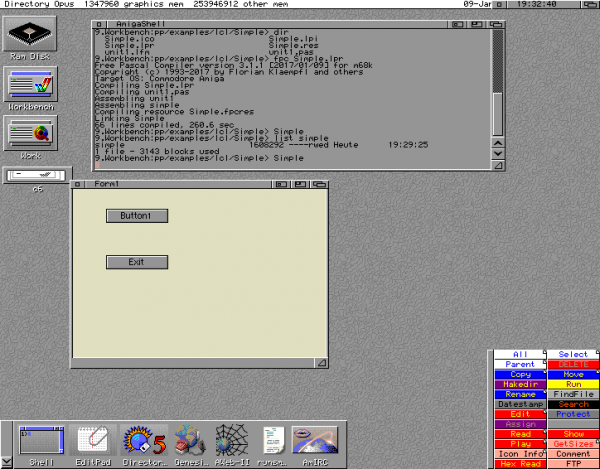
Something really awesome is going on in the Amiga Freepascal world. ChainQ is working together with Frank Wille (the Author of vbcc) to optimize the size of executables created by freepascal compiler. Some things had to be included to freepascal and vasm (the Assembler) and vlink (the Linker) had to be adjusted to freepascal, hence you need the latest nightly to test this. The result is truly remarkable.
Just as an example, I compiled the MUI-Demo from the muihelper session.
With LD it has 321k with the new section linking it has around 50k and of course it still work.
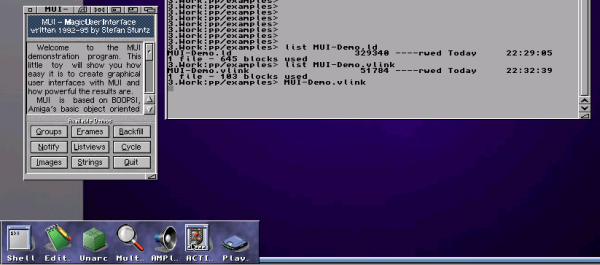
The original binary MUI Demo is around 25k, the difference should be the RTL which needs a little bit space, but also delivers more convenience and securtiy features for the coder (like string handling, memory management and helper functions)
We use the vlink a while already on Amiga m68k because it’s much faster and do not depend on ixemul.library. Now it also creates much smaller files. So no reason to keep the old GNU ld and with the vasm we also do not need the GNU as anymore, so in principle both ixemul.library dependencies are gone. I will test that a while expecially also with LCL applications, they are huge now, I’m curious how somall they can become.
If you would like to test download a current nightly for m68k-amiga. I included the vasm and vlink already and also activated it as default.
The same thing should be also working for MorphOS, this I will try soon, so stay connected.
Again a year passed so I will try to give a short summary about things going on in the Freepascal world for Amiga-style systems.
In Januar 2016 a big change in Freepascal was done to fix the Varargs version of the amiga library version. All „array of const“ are replaced with the better „array of PtrUInt“ which is much better to emulate the open end parameter list
The MorphOS LCL implementation took a big step in the begin of the year until got the usual suspects to work. All resulted in the first MorphOS FPC release including LCL units in March 2016.
A little funny new experience started also in March. I created the first 64Bit ABIv1 AROS distribution. Mainly, of course because I need a test field for the FreePascal AROS x64. For me x64 would be the perfect successor of the i386-aros ABIv1. My suggestion for AROS developer would be to leave i386 ABIv0 as it is, backport changes to there. And change then to x64 ABIv1 (and do not use/promote i386 ABIv1). But the x64 AROS still need much work, many things still crash, much code still cast Pointers to integer so not 64bit ready. This is also the main reason the 64bit distribution did not get much new version, not much changed with the problems there, I retest the usual problems from time to time. Also the FPC 64bit had big problems, which I found out end of 2016 are mainly alignment problems, where AROS made it’s own life much harder than it should be. (reminder „stacked int“s)
EdiSyn got a new Version with some bugfixes and basic printing support. End of year it got also a ARM version of EdiSyn to public with some more advanced features.
I also tried EdiSyn on MorphOS and Amiga. But both have some problems because of the different behavior of MUI and Zune. And I did not took much work on it because on MorphOS there is already a very good Editor with syntax highlighting and on Amiga m68k it’s just too slow. But in principle it works just LCL need some more work.
LCL on a native Amiga got some improvements to work also if no Graphic card is present, like my A1200 and also ported the usual suspects to m68k Amiga.
I used already a Lazarus on Linux to cross compile to AROS i386, in April I created a Lazarus which can cross compile for all supported Platforms (AmigaOS 3, AROS, MorphOS). Because it worked to nicely I planed to release a Lazarus for Linux including the binutils and cross compilers for all Amiga systems. But I noticed it is very difficult, even to write a Manual how to install such a systems. Therefore I decided to create a virtual machine which includes Lazarus, cross compilers and binutils for all Amiga Systems. After Amiga OS 4 was added to Freepascal and LCL I released a 2nd Version including the Amiga OS 4 binutils and cross compiler.
ChainQ implemented FreePascal for OS4 long time before already but because of changes in FreePascal and without a maintainer it did not compile anymore. In April ChainQ resurrected it and fixed some basic things, make it self compiling again. Then I took the lead and implemented some OS4units bring FP-IDE to work and finally the LCL with the usual suspects for OS4. Which resulted to a Amiga OS 4 FPC release including LCL. I will continue to maintain the OS4 fpc but will not improve it much more, maybe someone will appear to continue it especially with the unusual interfaces can be found on AmigaOS4.
I continued to work on applications using my LCL. This time I got the idea to create a Map application showing routes of my bike GPS. I played around with google maps API and openstreet API. Openstreetmap is much better because google maps you are forced to use the google libs which is difficult at AROS. It get some releases for all available platforms. I also experimented with GPS support, first via a extra program later also directly inside Mapparium, which is still not released.
Long Time before I got the direct linking of C static objects to freepascal programs at AROS to work, which was really nice, but no real program resulted from it. On magoriums work on mikmod, I got an idea for a Delitracker like program for AROS, to Play my old modules. I results into my first native Zune program (so without LCL wrapper) ZuPaPlayer. And because Delitracker is working directly on MorphOS and Amiga I concentrated on AROS.
There I also noticed its rather difficult to write MUI applications in Freepascal. In C there are many many macros to make it easier, but they are not directly possible to convert to pascal. There is a muihelper unit in MorphOS with some starts to make it easier. I moved it to ami-extra to make it available to all platforms and extended it a lot. To test and prove the usability of it I started to port the example codes of the official MUI 3.8 release. On Amiga it works very nice on AROS it shows very good the differences of MUI and Zune.
Because ChainQ included support for 68000 processor which need some more alignment care. Because of this I created a little RTL for Workbench 1.3 which is really difficult because much things are not available.
This year also the port of FPC to ARM AROS including LCL and the usual suspects was done.
I try to bring the MUI-LCL to the official repository, started with the basic LCL implementation. Announced at mailing list. We will see how it goes.
Worked a little bit more on the ABIv1 x86_64 started long time before. Found some errors and got the FP-IDE to work and some simple example sources. But LCL and fpGUI still do not work. The main reason for that are the changes between ABIv1/ABIv0 and some inconsistencies of 32bit/64bit types.
Bad thing, changes are not denoted in the C-header files for AROS, so it’s a very annoying comparing work done by hand to find if there are differences. Differences in Library offsets for functions in the most important libs are done and exec structures are also fixed.
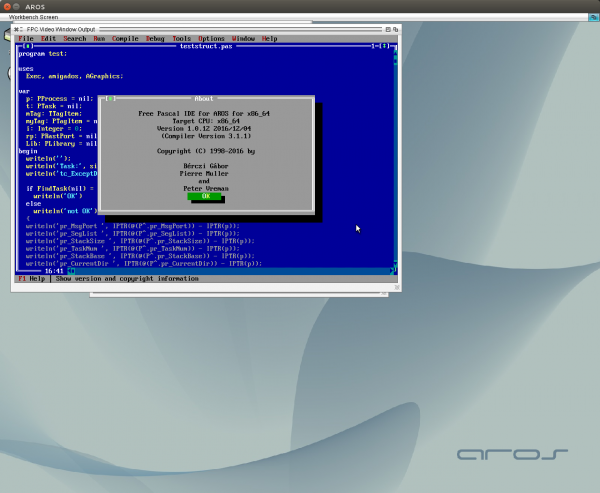
FP-IDE on x86_64 AROS






